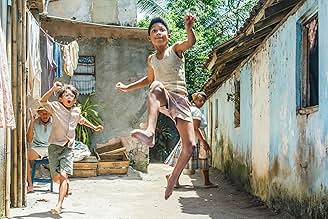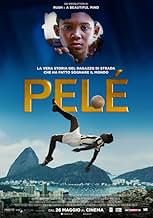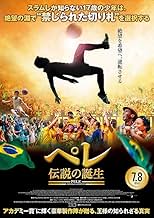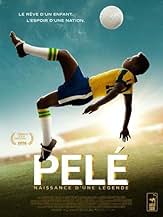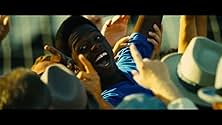IMDb-BEWERTUNG
7,1/10
22.232
IHRE BEWERTUNG
Der kometenhafte Aufstieg von Pele aus den Slums von Sao Paulo, der Brasilien im Alter von 17 Jahren zum ersten WM-Sieg führte, ist in diesem biografischen Drama festgehalten.Der kometenhafte Aufstieg von Pele aus den Slums von Sao Paulo, der Brasilien im Alter von 17 Jahren zum ersten WM-Sieg führte, ist in diesem biografischen Drama festgehalten.Der kometenhafte Aufstieg von Pele aus den Slums von Sao Paulo, der Brasilien im Alter von 17 Jahren zum ersten WM-Sieg führte, ist in diesem biografischen Drama festgehalten.
- Regie
- Drehbuch
- Hauptbesetzung
Phil Miler
- Narrator
- (Synchronisation)
Adriano Aragon
- French Announcer
- (Synchronisation)
Eric Bell Jr.
- Zoca
- (Synchronisation)
Empfohlene Bewertungen
PELE is probably the biggest name in the soccer history that has shaped & shifted the current playing style of modern day game. The extravagant career speaks for itself. The movie shows us the making & coming to be of PELE.
I see a lot pf people saying this movie is predictable, not so good & what not. to all of them & most importantly to all of u i say, this movie is more than just a football movie. Not every movie is supposed to be a thriller or an Avenger movie. simple things in life have a way of getting to us.
This movie is about small & humble beginnings, its about friendship , its about believing in one self, taking the risk. Movie shows us that is does not matter if u have all the resources or opportunities in the world. if u keep at it, if u find something that you are passionate about & stick to it, day by day, night after night, the results speak for itself.
Movie has amazing moments, really great camera work. one of the best for all the soccer movies out there. Even if one know nothing about the legend that PELE is, once you are into the movie, you cant resist to feel the journey he is going to make in life. I was finding myself constantly tears of joy rolling down my cheek coz i was hooked into the movie. had soo many of those watering your eyes moments that once the movie was over, i was filled with joy and happiness to have witness such a good work of art.
Acting & direction is simple & stunning. camera-work is amazing , specially in those moments you want to fell the greatness of the legend, the movie gives you that.
I'll keep going back to watching this movie , just to feel that joy of watching something beautiful in the making again & again.
I see a lot pf people saying this movie is predictable, not so good & what not. to all of them & most importantly to all of u i say, this movie is more than just a football movie. Not every movie is supposed to be a thriller or an Avenger movie. simple things in life have a way of getting to us.
This movie is about small & humble beginnings, its about friendship , its about believing in one self, taking the risk. Movie shows us that is does not matter if u have all the resources or opportunities in the world. if u keep at it, if u find something that you are passionate about & stick to it, day by day, night after night, the results speak for itself.
Movie has amazing moments, really great camera work. one of the best for all the soccer movies out there. Even if one know nothing about the legend that PELE is, once you are into the movie, you cant resist to feel the journey he is going to make in life. I was finding myself constantly tears of joy rolling down my cheek coz i was hooked into the movie. had soo many of those watering your eyes moments that once the movie was over, i was filled with joy and happiness to have witness such a good work of art.
Acting & direction is simple & stunning. camera-work is amazing , specially in those moments you want to fell the greatness of the legend, the movie gives you that.
I'll keep going back to watching this movie , just to feel that joy of watching something beautiful in the making again & again.
I grew up watching Football, i loved it and i still do, and of course i love my nation (Venezuela), but you just can't denied that you like Brasil for their style of playing, their amazing Joga Bonito, it's just masterful and beautiful that makes you think, can i do that?, there are 2 correct answers: you work all day, every day for a very long time to accomplish it, or just wait until another life and born with it like Pelé.
This is the guy that every Football player looks up to at least one time in their life, and of course for us Fottball lovers to know there is a movie about this legend it's like saying, there is a movie about Michael Jackson and you think: They better don't mess it up, because he is the best in the business and he deserves it. Trust me they have done it right in this film, the kid playing Pelé is really good with his ginga (freestyle of playing) and does honor to the man himself, he really capture the essence of what he means to every fan, player and Brazilian in the world. Makes me think, can he have Pelé's blood, yes he does, but not by family, but by nationality, they just have it in them.
The movie it's solid in the cinematography, it really shows the feeling of the country and their culture and the sport itself, the casting made me think some times about overacting, but i just forget about it and kept watching a great film. What i really loved is that Ginga is explained and gives real knowledge of what it means, it's now that they call it Joga Bonito, but they are the same: One amazing player. Donpt believe me? just take a good look yourself this movie and experience what Soccer (that's how Americans call it) it's really about, and you will have the most amazing teacher, Edson Arantes do Nascimento, or as is best known: Pelé.
This is the guy that every Football player looks up to at least one time in their life, and of course for us Fottball lovers to know there is a movie about this legend it's like saying, there is a movie about Michael Jackson and you think: They better don't mess it up, because he is the best in the business and he deserves it. Trust me they have done it right in this film, the kid playing Pelé is really good with his ginga (freestyle of playing) and does honor to the man himself, he really capture the essence of what he means to every fan, player and Brazilian in the world. Makes me think, can he have Pelé's blood, yes he does, but not by family, but by nationality, they just have it in them.
The movie it's solid in the cinematography, it really shows the feeling of the country and their culture and the sport itself, the casting made me think some times about overacting, but i just forget about it and kept watching a great film. What i really loved is that Ginga is explained and gives real knowledge of what it means, it's now that they call it Joga Bonito, but they are the same: One amazing player. Donpt believe me? just take a good look yourself this movie and experience what Soccer (that's how Americans call it) it's really about, and you will have the most amazing teacher, Edson Arantes do Nascimento, or as is best known: Pelé.
Brazilian teams play a style of soccer all their own. (Yeah, I called it soccer. Gimmie a break. I'm an American.) They call that style "ginga". It's a very fluid kind of play that emphasizes creative ball control. Some call this style of play "flamboyant". Others dismiss it as "trick plays". Brazilians simply think of it as
their heritage. The Urban Dictionary's definition of ginga states, in part, "Ginga is creativity... the opposite of mechanical soccer. It is having fun with the ball. It is grace. It is being fluid and coordinated. IT IS SOUL. IT IS DANCE." A June 15, 2014 "New York Times" article explains the development of ginga this way: "
an imaginative style of play that made competition and gratifying playfulness inseparable, with blacks and people of mixed race rising from exclusion and becoming its main protagonists." Ginga is a unique mixing of the skills of samba dancers with Brazilian martial arts fighters, all applied to the game of soccer, turning it into, as the Brazilians call it, "the beautiful game", while also celebrating Brazil's different races and cultures. The focus on ginga in the biopic "Pelé: Birth of a Legend" (PG, 1:47) educates its audience, celebrates that style of soccer and captivates Movie Fans with the true rags-to-riches story of the greatest soccer player ever, a man known all around the world simply as
Pelé.
As the film opens, the nearly 10-year-old Pelé (born Edson Arantes do Nascimento, and called "Dico" by his family and friends) is watching a television broadcast as his native Brazil loses the 1950 World Cup to Uruguay. Brazil's loss was a huge upset, a phrase which also describes the emotions of Brazil's soccer fans (which was basically everybody). The entire country was shocked, humiliated and demoralized. Dico (Leonardo Lima Carvalho) promises his father, a former soccer player known as Dondinho (played by Brazilian musician/actor Seu Jorge), that he, Dico, will one day bring Brazil a World Cup Championship.
Dico's family is so poor that Dico doesn't even own a soccer ball – or even a pair of shoes, but the kid manages to develop his natural talent anyway. Under his father's tutelage, he learns ball-handling by juggling and kicking grapefruits and he plays on a local team with his friends. Their team is literally called "The Shoeless Ones" and is mercilessly mocked by the town's rich kids, who single out Dico for a special measure of abuse and start calling him "Pelé". It's a made-up name which is meant to be an insult, and Dico hates the name, but as he works through his anger by helping his team play better than expected on the soccer field, the name sticks, and "Pelé" becomes synonymous with Dico and his amazing talent.
Continuing to hone his skills on his own time and play brilliantly on the field in spite of having to endure prejudice and personal tragedy, Pelé (played as a teenager by Kevin de Paula) is recruited and mentored by former player Waldemar De Brito (Milton Gonçalves). Pelé's talent gets him a spot on a professional soccer club, Santos FC, and then on Brazil's national team, all before he reached the age of 17. On the national team, Pelé's coach is Vicente Feola (Vincent D'Onofrio), the latest in a series of coaches who tries to beat Pelé's individuality out of him and force him to play a more traditional and "sophisticated" European style. Many Brazilians blamed the ginga style of play for the 1950 World Cup loss, but ginga is Pelé's strength. Pelé finds himself struggling with his coach's instruction, and an old adversary turned teammate, plus a significant knee injury, all while the national team prepares for the 1958 World Cup tournament and a possible championship matchup against the heavily-favored team representing the host country of Sweden, coached by the arrogant and condescending George Raynor (Colm Meaney).
"Pelé: Birth of a Legend" represents formulaic and unrefined filmmaking, but still manages to inspire on multiple levels. Co-written and co-directed by brothers Jeff and Michael Zimbalist (both working on their first feature film), the movie follows the tried-and-true pattern of most sports movies, but suffers from some minor issues of technique. The script sometimes stops short of completing its thoughts and the film is a bit over-edited, making the viewer feel like something is missing in a few of the scenes. Some characters are underdeveloped and some of the acting is shaky, but the main characters (especially D'Onofrio, Jorge and de Paula) all give strong performances. The film spends too much time on Pelé's childhood and not enough time on his rise through the ranks of Brazilian soccer, but does convey why Pelé was so good and wisely culminates with the '58 World Cup, at which point it's clear that all the pieces are finally in place for Pelé's eventual worldwide fame and unparalleled success. In spite of the film's lack of originality and other relatively minor problems, the Zimbalist brothers and their cast and crew give us plenty to shout about during the film's third act and leaves us with important lessons about determination, resilience and playing to our strengths, as well as the importance and strength of diversity. As much as I enjoyed "Pelé: Birth of a Legend" (especially its emotional ending), after fairly weighing all of its strengths and weaknesses, the most I can give it is a mild recommendation: "B"
As the film opens, the nearly 10-year-old Pelé (born Edson Arantes do Nascimento, and called "Dico" by his family and friends) is watching a television broadcast as his native Brazil loses the 1950 World Cup to Uruguay. Brazil's loss was a huge upset, a phrase which also describes the emotions of Brazil's soccer fans (which was basically everybody). The entire country was shocked, humiliated and demoralized. Dico (Leonardo Lima Carvalho) promises his father, a former soccer player known as Dondinho (played by Brazilian musician/actor Seu Jorge), that he, Dico, will one day bring Brazil a World Cup Championship.
Dico's family is so poor that Dico doesn't even own a soccer ball – or even a pair of shoes, but the kid manages to develop his natural talent anyway. Under his father's tutelage, he learns ball-handling by juggling and kicking grapefruits and he plays on a local team with his friends. Their team is literally called "The Shoeless Ones" and is mercilessly mocked by the town's rich kids, who single out Dico for a special measure of abuse and start calling him "Pelé". It's a made-up name which is meant to be an insult, and Dico hates the name, but as he works through his anger by helping his team play better than expected on the soccer field, the name sticks, and "Pelé" becomes synonymous with Dico and his amazing talent.
Continuing to hone his skills on his own time and play brilliantly on the field in spite of having to endure prejudice and personal tragedy, Pelé (played as a teenager by Kevin de Paula) is recruited and mentored by former player Waldemar De Brito (Milton Gonçalves). Pelé's talent gets him a spot on a professional soccer club, Santos FC, and then on Brazil's national team, all before he reached the age of 17. On the national team, Pelé's coach is Vicente Feola (Vincent D'Onofrio), the latest in a series of coaches who tries to beat Pelé's individuality out of him and force him to play a more traditional and "sophisticated" European style. Many Brazilians blamed the ginga style of play for the 1950 World Cup loss, but ginga is Pelé's strength. Pelé finds himself struggling with his coach's instruction, and an old adversary turned teammate, plus a significant knee injury, all while the national team prepares for the 1958 World Cup tournament and a possible championship matchup against the heavily-favored team representing the host country of Sweden, coached by the arrogant and condescending George Raynor (Colm Meaney).
"Pelé: Birth of a Legend" represents formulaic and unrefined filmmaking, but still manages to inspire on multiple levels. Co-written and co-directed by brothers Jeff and Michael Zimbalist (both working on their first feature film), the movie follows the tried-and-true pattern of most sports movies, but suffers from some minor issues of technique. The script sometimes stops short of completing its thoughts and the film is a bit over-edited, making the viewer feel like something is missing in a few of the scenes. Some characters are underdeveloped and some of the acting is shaky, but the main characters (especially D'Onofrio, Jorge and de Paula) all give strong performances. The film spends too much time on Pelé's childhood and not enough time on his rise through the ranks of Brazilian soccer, but does convey why Pelé was so good and wisely culminates with the '58 World Cup, at which point it's clear that all the pieces are finally in place for Pelé's eventual worldwide fame and unparalleled success. In spite of the film's lack of originality and other relatively minor problems, the Zimbalist brothers and their cast and crew give us plenty to shout about during the film's third act and leaves us with important lessons about determination, resilience and playing to our strengths, as well as the importance and strength of diversity. As much as I enjoyed "Pelé: Birth of a Legend" (especially its emotional ending), after fairly weighing all of its strengths and weaknesses, the most I can give it is a mild recommendation: "B"
The best movie ever, because I feel very inspired by this amazing and one of a kind movie.
Greetings again from the darkness. From rags to riches
a common expression that often leads to a paint-by-numbers movie. Co-directors Jeff Zimbalist and Michael Zimbalist are fortunate in that their "coming of age" subject is the globally famous Pele' – often considered the greatest soccer/futbol player of all-time.
Rather than revisit the career of the transcendent player who later dedicated his life to humanitarian causes, the film kicks off with a 17 year old Pele trotting out onto the pitch at the 1958 World Cup. It then flashes back 8 years to when 9 year old "Dico" was growing up in the slums of Sao Paulo. We get to see his relationship with his family his dad taught him to play, and his friends were loyal to him and encouraged him to pursue his dream.
There are some similarities to "The Sandlot" as we watch the joy these boys have in playing the sport whenever and wherever they can plus the origin of the somewhat derogatory and now immortal nickname. It seemed that Pele' was able to carry this love of the game throughout his career. We see boys huddled around a radio listening to the 1950 World Cup as Brazil's team was humiliated an event that played a role in Pele' returning pride to a bruised country.
Kevin de Paula plays Pele' as he works his way up through the age groups and national teams. Often the youngest and shortest player, the film depicts him as a shy kid often out of his element the polar opposite to the beaming superstar we so often saw later in his career. There is an explanation of the roots of the "Ginga" style and its ties to the Brazilian culture and martial arts.
For some reason, Vincent D'Onofrio is cast as Brazil's Coach Feola and we are forced to endure a tortuous accent that is basically inexcusable these days. There are also some exaggerations in the crowd scenes and shots of the press, though young de Paula underplays the lead. Colm Meaney plays George Raynor, the coach of Sweden in that infamous 1958 World Cup, and we do get a cute little cameo from Pele' himself.
The film does a nice job with the young man's childhood and progression towards superstar (the IOC named him the athlete of the century). He is presented as close to his family, and inherently quiet and calm. The match clips of Pele' that play over the closing credits are proof that a movie just can't capture the transcendence of his talent. Pele' is truly the reason it's "the beautiful game".
Rather than revisit the career of the transcendent player who later dedicated his life to humanitarian causes, the film kicks off with a 17 year old Pele trotting out onto the pitch at the 1958 World Cup. It then flashes back 8 years to when 9 year old "Dico" was growing up in the slums of Sao Paulo. We get to see his relationship with his family his dad taught him to play, and his friends were loyal to him and encouraged him to pursue his dream.
There are some similarities to "The Sandlot" as we watch the joy these boys have in playing the sport whenever and wherever they can plus the origin of the somewhat derogatory and now immortal nickname. It seemed that Pele' was able to carry this love of the game throughout his career. We see boys huddled around a radio listening to the 1950 World Cup as Brazil's team was humiliated an event that played a role in Pele' returning pride to a bruised country.
Kevin de Paula plays Pele' as he works his way up through the age groups and national teams. Often the youngest and shortest player, the film depicts him as a shy kid often out of his element the polar opposite to the beaming superstar we so often saw later in his career. There is an explanation of the roots of the "Ginga" style and its ties to the Brazilian culture and martial arts.
For some reason, Vincent D'Onofrio is cast as Brazil's Coach Feola and we are forced to endure a tortuous accent that is basically inexcusable these days. There are also some exaggerations in the crowd scenes and shots of the press, though young de Paula underplays the lead. Colm Meaney plays George Raynor, the coach of Sweden in that infamous 1958 World Cup, and we do get a cute little cameo from Pele' himself.
The film does a nice job with the young man's childhood and progression towards superstar (the IOC named him the athlete of the century). He is presented as close to his family, and inherently quiet and calm. The match clips of Pele' that play over the closing credits are proof that a movie just can't capture the transcendence of his talent. Pele' is truly the reason it's "the beautiful game".
Wusstest du schon
- WissenswertesThe Old Guy in suit who's tea was dropped by the Brazilian team at the hotel before the Final of 1958 World cup was actually the real Pele as himself.
- PatzerIn the film, Pelè's mother is a servant in Josè Altafini "Mazzola's" home. In real life, both Pelè and Altafini were from modest families. They also lived in different towns.
- Crazy CreditsThe end credits include the disclaimer that "The persons and events in this motion picture are fictitious. Any similarity to actual persons or events is unintentional." Which is of course ridiculous considering this is a biopic of Pelé loaded with real events (like the 1958 world cup).
- VerbindungenFeatures 1958 FIFA World Cup (1958)
Top-Auswahl
Melde dich zum Bewerten an und greife auf die Watchlist für personalisierte Empfehlungen zu.
- How long is Pele: Birth of a Legend?Powered by Alexa
Details
- Erscheinungsdatum
- Herkunftsland
- Offizieller Standort
- Sprachen
- Auch bekannt als
- Pele: Birth of a Legend
- Drehorte
- Produktionsfirmen
- Weitere beteiligte Unternehmen bei IMDbPro anzeigen
Box Office
- Bruttoertrag in den USA und Kanada
- 57.046 $
- Eröffnungswochenende in den USA und in Kanada
- 7.226 $
- 15. Mai 2016
- Weltweiter Bruttoertrag
- 7.846.608 $
- Laufzeit1 Stunde 47 Minuten
- Farbe
- Seitenverhältnis
- 2.35 : 1
Zu dieser Seite beitragen
Bearbeitung vorschlagen oder fehlenden Inhalt hinzufügen




